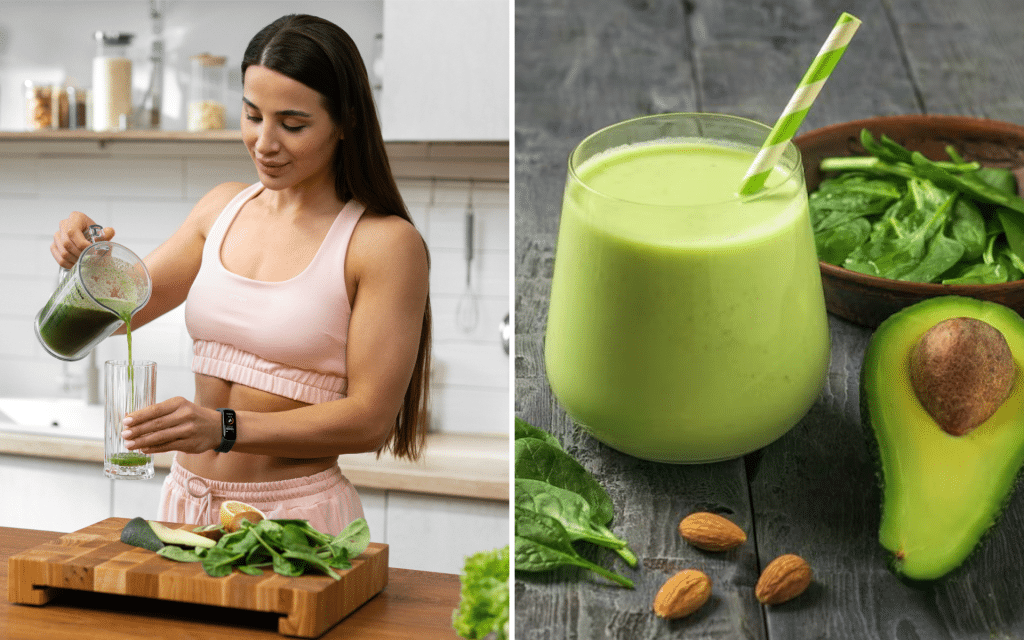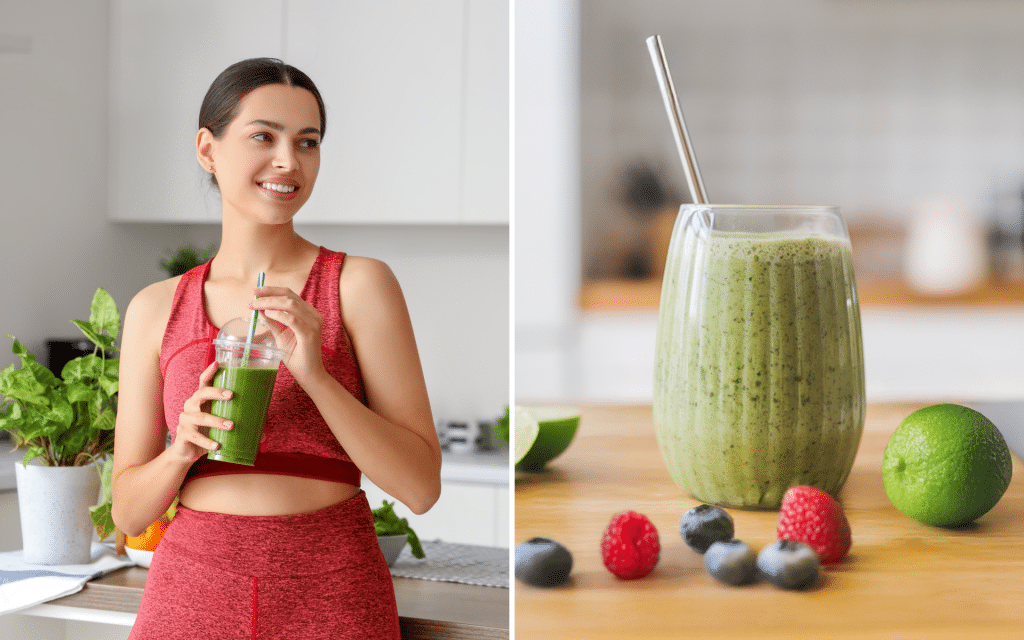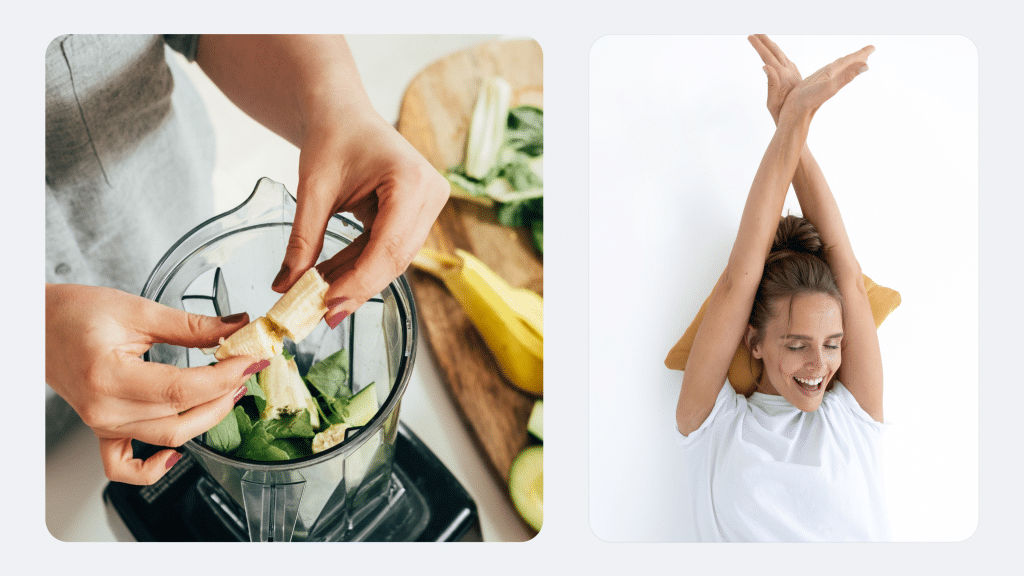There are countless diets for weight loss.
Some diets, like the Keto diet, focus on eliminating carbohydrates.
Others, like the Mediterranean diet, emphasize whole, plant-based foods and healthy fats like olive oil.
Diet experts have proved that maintaining a calorie deficit while on any diet can help people lose weight and improve overall health.
The 21-Day Smoothie Diet is a popular program that promises quick weight loss by replacing meals with smoothies.
But is it worth giving up solid food for three weeks in exchange for a liquid-only diet?
Before jumping into any new eating plan, it’s essential to consider the potential benefits and drawbacks.
Let’s take a closer look at what the 21-Day Smoothie Diet entails and whether or not it might be right for you.
What Is The 21 Day Smoothie Diet?
Many people wonder, “What is a 21-day smoothie diet plan, and is it worth trying?”
Health coach Drew Sgoutas created the 21 Day Smoothie Diet to jumpstart weight loss.
The program involves replacing two daily meals with specially designed smoothies, one solid meal, and two snacks.
The smoothies contain a variety of:
- Fruits
- Vegetables
- Protein powders
- Healthy fats like avocado or almond butter
The goal is to provide all the necessary nutrients while keeping calorie intake low.
What else comes with the 21 day smoothie diet plan?
- Recipes for the smoothies
- A 21-day meal plan
- Shopping lists
As for calorie intake, the program recommends you keep track of what’s in your meal but doesn’t restrict you to a specific number.
Instead, the focus is on eating nutrient-dense foods and avoiding ultra-processed and high-calorie options.
There are many variations of smoothie diets, each with its specific guidelines and meal plans.
Some may require a complete liquid diet for 21 days, while others allow one solid daily meal.
Although scientific research doesn’t support most smoothie diets, proponents claim they can help:
- Increase energy levels
- Promote weight loss
- Improve digestion
Are Smoothie Diets Safe?
Smoothie diets, like the 21-Day Smoothie Diet, may temporarily boost weight loss and introduce people to healthier eating.
However, they should not replace well-rounded, sustainable eating habits and should not be a long-term solution.
A safe approach to any diet prioritizes overall health, provides balanced nutrition, and is realistic to maintain long-term.
Potential Health Benefits of Smoothie Diets
1. Nutrient-Dense Meals
Smoothies packed with fruits, vegetables, nuts, seeds, and protein powders can deliver a significant amount of:
- Vitamins
- Minerals
- Antioxidants
When thoughtfully prepared, they offer a convenient way to meet your body’s nutritional needs in one drink.
2. Weight Loss Support
Replacing high-calorie, ultra-processed meals with lower-calorie, nutrient-rich smoothies can help create a calorie deficit, one of the key factors in weight loss (1).
Additionally, smoothies’ portion-controlled nature makes tracking calories easier.
3. Improved Digestion
Many smoothie recipes feature ingredients like leafy greens, fiber-rich fruits, and lots of fluids, which can promote digestive function and gut health (2).
4. Convenience
Having a set meal plan and not worrying about food choices can make the diet easier to follow. Smoothies are also portable, making them a good option for on-the-go meals.
When it comes to weight loss, progress is made by inches, not miles, so it’s much harder to track and a lot easier to give up. The BetterMe: Health Coaching app is your personal trainer, nutritionist, and support system all in one. Start using our app to stay on track and hold yourself accountable!
Potential Drawbacks and Risks
1. Risk of Nutritional Gaps
While smoothies are nutrient-dense, they are not nutritionally complete and may lack the complexity of whole meals.
If the smoothie diet lacks essential components, such as:
- Fiber
- Healthy fats
- Certain vitamins and minerals
Over time, this could lead to deficiencies, especially if you follow the diet for an extended period.
2. Rapid Weight Loss Concerns
Drastic weight loss, often associated with low-calorie diets, can have downsides.
This low-calorie intake can cause:
- Slowed metabolism
- Muscle loss
- Fatigue (3)
Additionally, once you return to your regular eating habits, there’s a higher risk of regaining the lost weight.
3. High Sugar Intake
Some smoothie recipes rely heavily on fruits, increasing the intake of natural sugars.
Although these sugars are healthier than processed ones, overdoing them can still lead to blood sugar spikes and crashes, particularly for individuals with impaired glucose metabolism (4).
4. Sustainability and Hunger
Liquid-heavy diets may not satisfy everyone, leading to constant hunger.
This non-satisfaction can make sticking to the plan challenging, especially for those who prefer the texture and variety of solid food.
5. Lack of Robust Scientific Backing
While smoothie diets may have gained popularity, limited, robust scientific research specifically focused on their long-term effects and sustainability exists.
While people may have observed short-term benefits, the lack of extensive scientific evidence makes it challenging to determine the potential risks and benefits of relying solely on smoothies for nutrition.
It is always advisable to consult with a healthcare professional or registered dietitian before adopting any restrictive or specialized dieting approach to ensure it aligns with individual nutritional needs and goals.
Read more: Renal Diet List of Foods: 8 Kidney-Friendly Options
Can I Lose Weight By Only Drinking Smoothies?
If prepared wisely, smoothies can be low in calories and rich in nutrients.
This combination makes them an appealing option for those who want to lose weight.
Drinking smoothies can also simplify meal planning and help you control calories.
Sticking to a calorie-controlled diet is one of the most effective ways to lose weight.
Many 21 day smoothie diet recipes include fiber-rich ingredients which can help you feel fuller longer, even if you’re consuming fewer calories, such as:
- Leafy greens
- Seeds
- Fruits
However, the initial weight you lose on this type of diet is often water weight.
Sustained weight loss requires long-term dietary and lifestyle changes beyond 21 days.
Relying solely on smoothies for an extended period may not be a realistic or healthy approach to weight loss.
Also, while smoothies may help you shed pounds, the speed of a 21 day smoothie diet plan for weight loss can sometimes do more harm than good.
Rapid weight changes can put stress on the body and increase the risk of regaining lost weight later on.
How Much Weight Can You Lose On The 21-Day Diet?
So, are smoothies good for weight loss?
Most 21-day weight loss reports are anecdotal, meaning the authors based their reports on personal experiences. Individual results vary depending on factors like starting weight, activity level, and diet adherence.
Some dieters have reported losing up to 10 pounds in three weeks, while others see a more modest change.
Ultimately, the weight you can lose depends on how closely you follow the meal plan and your body’s response.
Remember that the Centers for Disease Control and Prevention recommends a steady weight loss rate of one to two pounds weekly for sustainable results (5).
Losing more than that can lead to muscle loss, fatigue, and other health risks.
How Many Pounds Can I Lose On The 21-Day Smoothie Diet?
Individuals following a 21-day smoothie diet may lose five to ten pounds. However, as mentioned previously, individual results may vary depending on factors like starting weight and adherence to the plan.
Focusing solely on the number of pounds lost can undermine the importance of incorporating more nutrient-dense meals into one’s diet with beneficial factors like:
- Improved digestion
- Increased energy levels
- Overall well-being that can come with these new habits
How Can You Healthily Follow A 21-Day Smoothie Diet?
The healthiest way to approach a 21-day smoothie diet is by using it to add more nutritious foods to your diet while cutting back on ultra-processed and high-calorie options.
Here are some helpful tips:
Focus On Whole Foods And Nutrient Quality
A smoothie is only as good as what you put in it.
Focus on nutritious, minimally processed ingredients for a full spectrum of nutrients.
- Use various fruits and vegetables for fiber, vitamins, and phytonutrients.
- Blend greens like spinach or Swiss chard with fruits for added nutrients.
- Rotate your greens and produce throughout the week for varied nutrition.
- For satiety and lasting energy, include healthy fats and proteins like avocado, seeds (such as flax or chia), almond butter, or Greek yogurt.
Ensure Adequate Calorie Intake
While limiting your calorie intake is essential for weight loss, avoid restricting yourself too much.
Eating below your body’s daily energy needs can lead to these issues, making weight maintenance or regain more challenging:
- Fatigue
- Slow metabolism
- Nutrient deficiencies
Use an online calculator to estimate your daily calorie needs based on:
- Age
- Sex
- Height
- Weight
- Activity level (6)
Aim to stay within 500-750 calories below this number.
Include Other Healthy Foods In Your Diet
While smoothies may make up most of your meals during the 21 days, don’t neglect other food groups.
Incorporate whole, nutrient-dense foods such as:
- Lean protein
- Whole grains
- Healthy fats
These nutritious foods provide essential nutrients and help maintain a balanced diet.
Remember to stay hydrated by drinking plenty of water and incorporating other low-calorie beverages, such as herbal teas, into your day.
Discover 30 day smoothie diet plans designed to boost your energy, support weight loss, and offer a variety of delicious, nutrient-packed recipes for a healthier lifestyle.
Listen To Your Body
Listen to your body’s cues while following any diet plan, including the 21-day smoothie diet. If you’re feeling excessively hungry or fatigued, it may be a sign that you need more calories or different nutrients in your meals.
Pay attention to how specific foods make you feel and adjust accordingly. Stay in tune with hunger and fullness cues to avoid overeating or undereating.
Increase Physical Activity
While the best smoothies for weight loss can be helpful tools in shedding pounds, incorporating regular physical activity is also crucial for overall health and sustainable weight management.
Aim for at least 30 minutes of moderate to vigorous exercise daily, such as:
- Cycling
- Brisk walking
- Strength training
Daily physical activity aids weight loss and improves mood, energy levels, and overall well-being.
Read more: 3-Day Smoothie Detox Plan for Better Health
Who Should Not Follow A 21-Day Smoothie Diet?
While the 21-day smoothie diet might appeal to those looking for a quick diet reset or weight loss boost, it’s not suitable for everyone.
Certain groups of people should think twice about attempting this diet due to potential health risks and lifestyle incompatibilities.
1. Individuals With Chronic Medical Conditions
Going on a restrictive diet can be harmful to individuals with chronic medical conditions.
These individuals may need specific dietary requirements that a smoothie diet may not meet, and any drastic changes could negatively affect their health.
2. Pregnant Or Breastfeeding Women
Pregnancy and breastfeeding require a well-rounded, nutrient-dense diet to support the mother and baby’s health.
A smoothie-only or predominantly liquid diet may lack crucial nutrients in the quantities needed during these phases, such as:
- Iron
- Calcium
- Healthy fats
A restrictive diet can also make it harder to meet increased calorie demands.
The BetterMe: Health Coaching app will provide you with a host of fat-frying fitness routines that’ll scare the extra pounds away and turn your body into a masterpiece! Get your life moving in the right direction with BetterMe!
3. Those With Eating Disorders Or A History Of Disordered Eating
For individuals who have a history of eating disorders, diets like the 21-day smoothie plan can be triggering.
Following a highly restrictive or liquid-only diet has the potential to encourage unhealthy eating behaviors or reinforce negative relationships with food.
Maintaining a balanced and flexible approach to eating is a healthier way for this group to achieve nutritional goals.
4. People With High-Calorie Needs
Athletes or individuals with physically demanding jobs often require higher calorie intakes than a smoothie diet might provide.
Smoothie-based meals may not offer enough calories, protein, or carbohydrates to fuel intense physical activity, potentially leading to fatigue or muscle loss.
5. Children And Teenagers
Children and teens are still growing and developing, meaning they need a diverse diet that supports:
- Bone development
- Hormonal changes
- Overall health
Restrictive diets, like those centered around smoothies, may lack key nutrients vital for young bodies, making them an inappropriate choice for this age group.
6. Individuals Prone To Digestive Issues
Although smoothies can promote digestion due to their fiber content, a diet heavy in raw fruits and vegetables can lead to bloating or stomach discomfort for some.
People with irritable bowel syndrome (IBS) or other gastrointestinal issues may find this diet aggravates their symptoms.
7. People Who Struggle With Long-Term Diet Adherence
The 21-day smoothie diet requires considerable discipline and commitment, making it feel overly restrictive for some.
Those who find it challenging to stick to structured meal plans might struggle with this diet and risk reverting to less healthy eating habits once the program ends.
8. Those Experiencing Extreme Fatigue Or Medical Recovery
If you’re recovering from surgery, illness, or an injury, your body needs ample energy and nutrients to heal appropriately.
A smoothie-only diet might not supply adequate macro- and micronutrients to support recovery, and its low-calorie nature could hinder the healing process.
Importance Of Consulting A Healthcare Professional
Before embarking on the 21-day smoothie diet—or any restrictive eating plan—it’s essential to seek guidance from a healthcare professional or registered dietitian.
They can assess your unique health needs, identify potential risks, and help you determine whether the diet suits you. This step is especially crucial if you have existing medical conditions, take medications, or have specific dietary requirements.
Yes, drinking two daily smoothies as meal replacements can help you lose weight if they are low in calories yet nutritionally balanced. Effective weight loss requires creating a calorie deficit while ensuring you get enough protein, fiber, and healthy fats. However, replacing meals with smoothies shouldn’t be done long-term as it is not a nutritionally complete or balanced eating pattern. You can consume only smoothies for a period, but it may lead to nutritional imbalances and isn’t long-term sustainable. If you or the diet creator did not plan properly, your smoothies may lack essential nutrients like protein, iron, and healthy fats. Consult a healthcare professional before starting a liquid-only diet. No, consuming unlimited fruit is unlikely to help you lose weight. While fruit is healthy, it doesn’t contain all the nutrients your body needs. A balanced approach that includes fruits in moderation along with other nutrient-dense foods is more effective for weight loss. To lose the most weight healthily in 21 days, combine a calorie-controlled diet like the 21-day smoothie plan or a healthy balanced diet with regular physical activity. Prioritize smoothies or meals with balanced protein, healthy fats, and fiber while staying hydrated and avoiding ultra-processed foods. Always consult a healthcare provider for personalized advice.Frequently Asked Questions
Will 2 smoothies a day help you lose weight?
Can I just drink smoothies instead of eating?
Can you eat unlimited fruit and lose weight?
How can I lose my maximum weight in 21 days?
The Bottom Line
Like any other specialized diet, Smoothie diets have potential benefits and drawbacks.
If you’re considering embarking on a smoothie diet, it’s essential to do your research and consult with a healthcare professional to ensure it aligns with your individual needs and goals.
As with any weight loss approach, you should prioritize sustainability and long-term health over quick fixes.
Health experts recommend a well-rounded diet that includes a variety of whole foods for optimal vitality and wellness.
Ultimately, the best way to achieve and maintain a healthy weight is through creating sustainable lifestyle habits that work for you.
DISCLAIMER:
This article is intended for general informational purposes only and does not serve to address individual circumstances. It is not a substitute for professional advice or help and should not be relied on for making any kind of decision-making. Any action taken as a direct or indirect result of the information in this article is entirely at your own risk and is your sole responsibility.
BetterMe, its content staff, and its medical advisors accept no responsibility for inaccuracies, errors, misstatements, inconsistencies, or omissions and specifically disclaim any liability, loss or risk, personal, professional or otherwise, which may be incurred as a consequence, directly or indirectly, of the use and/or application of any content.
You should always seek the advice of your physician or other qualified health provider with any questions you may have regarding a medical condition or your specific situation. Never disregard professional medical advice or delay seeking it because of BetterMe content. If you suspect or think you may have a medical emergency, call your doctor.
SOURCES:
- Calorie Deficit: What To Know (2022, clevelandclinic.org)
- Fiber, Digestion, and Health (2012, health.cornell.edu)
- 5 alarming dangers of extreme weight-loss you can’t afford to ignore (2023, activesgcircle.gov.sg)
- Fruit and Diabetes (n.d., diabetes.org.uk)
- Steps for Losing Weight (2023, cdc.gov)
- Do You Know How Many Calories You Need (n.d., fda.gov)












